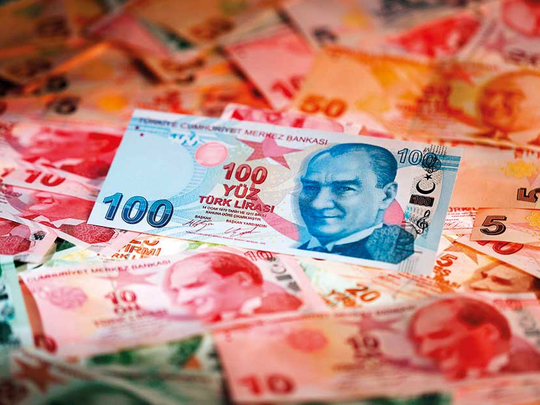
Ankara: The Turkish currency was again sharply volatile on Tuesday as traders digested measures proposed by President Tayyip Erdogan to guard local currency savings against precisely such swings.
The lira had fallen as much as 8.6 per cent intraday on Tuesday and rose as much as 18.5 per cent on its second-largest daily range, behind Monday’s record swings.
One-month implied volatility on the lira, or expected price swings, jumped to the highest on record, reflecting uncertainty about the scheme.
Central bank support
On Tuesday, the Turkish central bank said it will support the conversion of foreign currency deposit accounts into lira deposit accounts to further encourage reverse dollarization.
“In the event that resident real persons, who already had an FX deposit account ... convert their accounts into Turkish lira time deposit accounts will be eligible to benefit from the incentive,” the central bank said.
More than half of locals’ savings is in foreign currencies and gold, according to central bank data, due to a loss of confidence in the lira after years of depreciation. At its low, the lira was down some 60% on the year.
Erdogan introduced a series of steps on Monday that he said would shift the burden of a weakened currency to the Treasury and encourage Turks to hold lira rather than dollars.
The government’s initial support for the currency sent the lira soaring some 25 per cent on Monday, albeit in the lowest volume of trading for any day so far this year.
Inflationary pressures
Analysts and bankers warned that if the lira’s rally reverses it could further stoke already high inflation.
Finance Minister Nureddin Nebati said on Tuesday that speculative market comments made on social media amid the volatility have been met with legal proceedings.
“We will never allow such treason,” he said.
A source with knowledge on the matter said the Monday measures were decided after the exchange rate hit “problematic” levels, adding that the government would manage the coming period carefully.
“The dollar and euro had risen up to the point of forming a bubble really. This needed to be intervened in. This situation was not sustainable,” the person said, requesting anonymity.
Turkey’s five-year credit default swaps, the cost of insuring against sovereign default, were at 604 basis points after hitting on Monday 622 bps, the highest since May 2020, according to IHS Markit.








